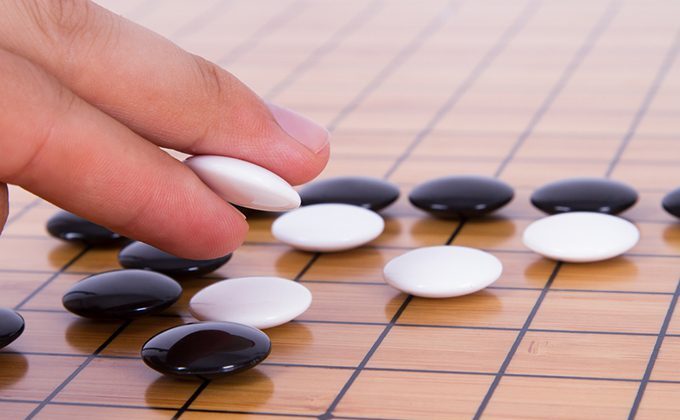I’ve come up with a new economic law. I’ve christened it the Go Principle. Here it is: Whichever country wins the most international Go championships will also have the most robust economic growth. (For anyone who doesn’t know, Go is a chess-like board game played on a 19×19 grid.)
Here’s my proof.
Until the mid-1990s, Japan regularly won all the big international Go competitions. Then, from the mid-1990s, as Japan sank into two decades of economic stagnation, Korea took over as regular Go champion, at the same time as its electronics sector was pulling ahead of Japan’s. That state of affairs lasted until 2010, when China established dominance.
Go is a complicated game—so complicated that no one’s yet devised a program enabling computers to outsmart professional players—and luck plays no part in it. More than that, it’s a game that demands deep strategic thinking.
Go was popular with Japan’s great shoguns like Oda, Toyotomi and Tokugawa in the 16th and 17th centuries. Modern politicians such as Naoto Kan, prime minister at the time of the Great East Japan Earthquake, and Ichiro Ozawa, influential “shadow shogun” of the Liberal Democratic Party, are also known to enjoy the game.
In the West, the game has garnered some equally distinguished fans. The mathematician John Nash (as played by Russell Crowe in the 2001 film A Beautiful Mind) was so inspired by Go that he invented a similar game called Hex. Microsoft founder Bill Gates is also a serious player.
I can see why Go has so many influential fans. The game demands the same sort of decision-making needed in war, politics or business. It’s all about analyzing, prioritizing and strategizing.
In the late nineteenth century, Japan was very much the top dog for Go in Asia. Players from Korea, China and Taiwan came here to study the game, then returned home to establish Go Federations in their own countries.
Where did it all go wrong for us?
I attribute Japan’s decline to three factors.
1. Computer games eroding the position of traditional board games in the 1980s
2. Big Japanese companies like Toyota and Fujitsu ceasing to sponsor Japan-based international championships (The biggest ones are now sponsored by LG and Samsung in Korea.)
3. Lack of public support (In Korea and China, Go champions are celebrities on a par with singers or sportspeople. That’s not the case for any of Japan’s 180 professional Go players.)
I took up Go at the age of forty. I just wanted to try something new to keep myself fresh, but I ended up getting addicted and turning evangelical. I got all my sons—and even the executive committee members of my company—to play!
In 2013, I was invited to become a director of the Go Federation of Japan. Naturally, I said yes. My motivation was threefold.
1.To increase Japan’s population of Go fans
2.To get Japan winning international competitions again
3.To increase the number of pro championships in Japan

I’ve managed to fulfill one of my goals already. In early May, my company sponsored the GLOBIS Cup, the world’s first Under-20 Go championships.
Of course, my overriding goal is much grander. By helping to foster a new generation of Go players, I hope to spawn a new generation of strategically minded leaders who will reinvigorate Japan and give it back some of the raw energy that seems to have migrated to Korea and to China.
That’s why I’m happy to report that both the finalists in the first GLOBIS Cup were Japanese. The Korean and Taiwanese contenders were knocked out in the quarterfinals and the Chinese in the semis to the surprise of their Go federations. The fact that no Japanese had won at an international tournament since 1997 (the year the two sixteen-year-old finalists were born) only made the shock worse.
Personally, I hope that this victory heralds a resurgence in Japanese Go—followed by a general resurgence in Japan’s economy.
So what do you think of my project to indirectly revive Japan by reestablishing our dominance in board games? Do you think it’s at all realistic, or is it a no-go from the get-go?
Let me know your thoughts.
(Cover photo: shutterstock / yanugkelid)



